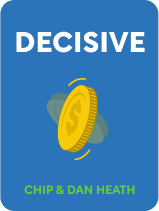

This article is an excerpt from the Shortform book guide to "Decisive" by Chip and Dan Heath. Shortform has the world's best summaries and analyses of books you should be reading.
Like this article? Sign up for a free trial here.
Do you base your decisions on emotions or facts? Why is objectivity important in decision-making?
When we make decisions, we’re prone to confirmation bias—seeking information that confirms our existing beliefs and biases. This prevents us from making credible predictions by distorting how we interpret information, leading to suboptimal decisions.
Here are two simple rules for objective decision-making.
1. Seek Out Objective Information
The authors argue that due to our confirmation bias, we trust our biased instincts over more accurate data about what people in a similar situation have experienced. To overcome this, we can seek out objective information.
One way to do this is to pay attention to base rates: statistics that describe the percentage of a population for which something is true. For example, the aforementioned college applicant could compare base rates from each college that show what percentage of its art majors find a job in the arts after graduation.
(Shortform note: If you’re unfamiliar with base rates or statistics in general, you might worry about misinterpreting data you find. One way to ensure you wisely interpret data is to research a statistic’s sample size: the number of people it represents. For example, if the college applicant encountered a statistic that read, “100% of our 2020 art program graduates found a job in the arts,” they could follow it up with this question: “How many students graduated that year?” If the answer is three, the statistic may be less revealing than if the answer is 300.)
The authors offer another piece of advice for objective decision-making: Ask an expert questions that prompt them to share factual information, specifically. The authors recommend that you avoid asking questions about the future. For example, the college applicant shouldn’t ask the counselor, “Do you think this program will prepare me for an art career?” This question may fall prey to the counselor’s own biases. Instead, the authors instruct us to ask questions about the past and the present. An expert provides a more objective perspective on these types of questions.
- A present-focused question: “What are ways you provide current students with job experience?”
- A past-oriented question: “What are some arts-based careers that recent graduates have found?”
(Shortform note: When talking with an expert to gather objective information, how can we distinguish between subjective and objective statements they make? One tip is to be on the lookout for words or phrases that make value judgments, as these often indicate a statement is subjective. Phrases such as “worse then,” or “better than,” and “could mean that,” all reflect a speaker’s subjective interpretation.)
2. Conduct a Trial Run
Another way to consider objective information is to generate it yourself by conducting a trial run of at least one option. A trial run is a test that allows you to accurately evaluate an option, since it provides evidence of the option’s outcomes. This evidence helps you make an informed prediction about how the decision may pan out long-term.
For example, a man who’s unsure whether he wants to move in with his partner could conduct a trial run by moving in with them for two weeks. This experience and its pros and cons could inform whether or not he stays beyond that time.
| Barriers to Conducting Trial Runs Someone’s privilege may influence whether they can afford to conduct trial runs for certain types of decisions. For example, internships are a common way for college students and recent graduates to give a career they’re interested in a trial run. However, internships are often unpaid: In 2019, 43% of internships at for-profit companies were unpaid. This means that only those with existing wealth can afford to complete the internships. Furthermore, students of color are underrepresented in unpaid internships because white students have greater access to wealth. Some recent efforts to ensure pay for interns have been successful, such as a six-year grassroots campaign to ensure the White House pays its interns. |

———End of Preview———
Like what you just read? Read the rest of the world's best book summary and analysis of Chip and Dan Heath's "Decisive" at Shortform.
Here's what you'll find in our full Decisive summary:
- Why our minds are wired to make bad decisions
- How biases and cognitive flaws distort your thinking
- A four-step process to improve your decision-making






